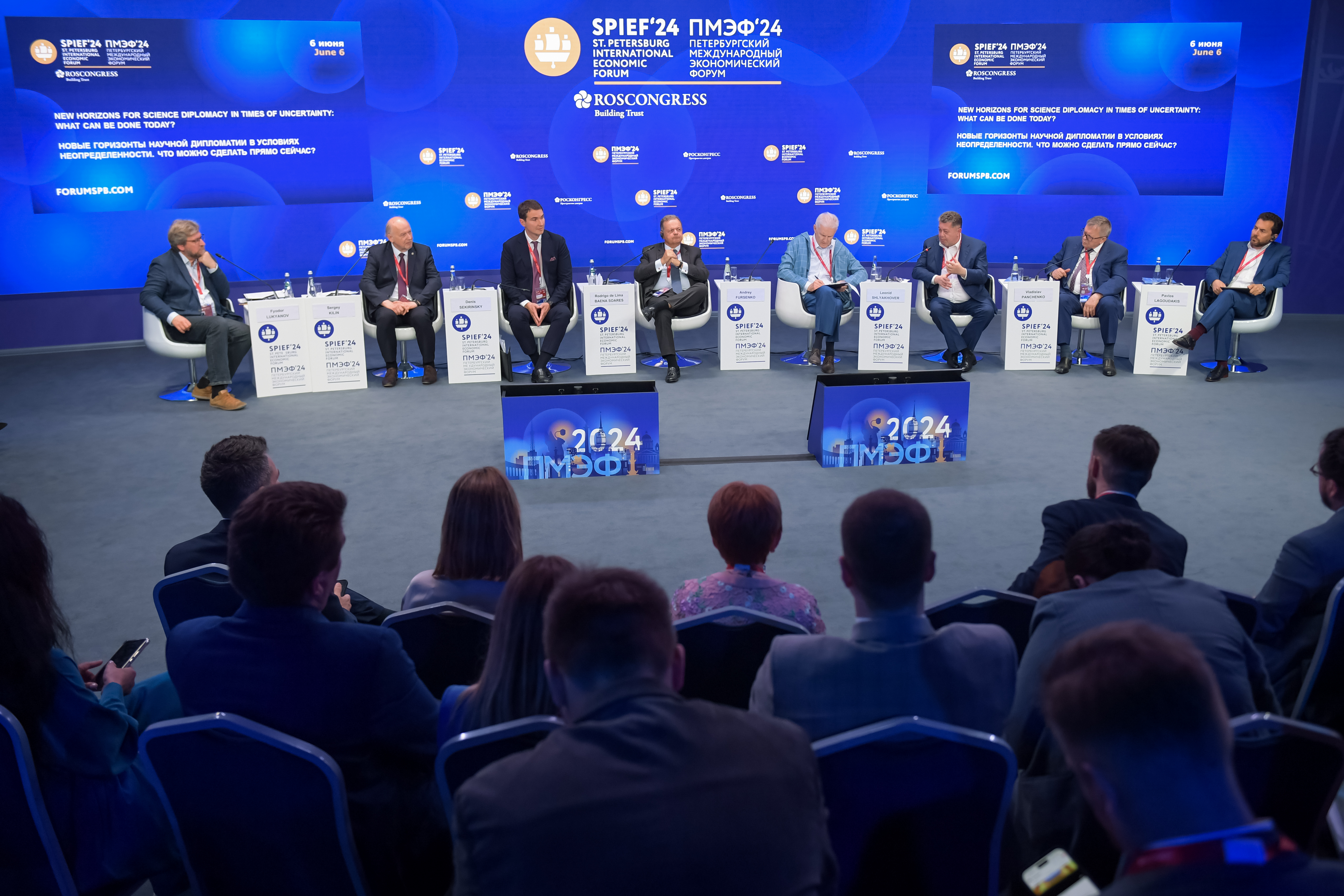Новости 07.06.2024
New science diplomacy horizons discussed at SPIEF

On June 6th, a panel discussion on “New Horizons for Science Diplomacy in Times of Uncertainty: What Can Be Done Today?” hosted by the VYZOV Foundation was held at the St. Peterburg International Economic Forum (SPIEF). The representatives of science and government discussed ways of building and maintaining scientific ties between countries and the crucial role of science diplomacy in addressing this issue.
“In my opinion, this is the most interesting panel discussion of the entire forum. I'm glad to be here today. Science is a bridge between nations and countries, and we are interested in being closer to each other,” said Ambassador Extraordinary and Plenipotentiary of the Federative Republic of Brazil to the Russian Federation Rodrigo de Lima Baena Soares.
Andrey Fursenko, Assistant to the President of the Russian Federation, emphasized that international cooperation in science must continue despite geopolitical differences. “We are not closing our doors. This is important both for our foreign colleagues and for us, and most importantly, it keeps open the opportunities for cooperation. We have reasons to be optimistic. Russia’s openness and readiness to cooperate that we demonstrate is an important factor in ensuring that there are more of these reasons.”
Denis Sekirinsky, Deputy Minister of Science and Higher Education of the Russian Federation, spoke about three key principles of science diplomacy. In his opinion, they include having your own position and the ability to defend it, knowing and respecting your partner, as well as engaging in collaborative efforts. “The Young Scientists Congress, which this year will be held together with the BRICS Young Scientist Forum, will become a space for developing a new dialogue based on these three elements,” noted Denis Sekirinsky.
Vladislav Panchenko, Vice-President of the Russian Academy of Sciences and Vice-President of the Kurchatov Institute Research Center, noted that despite geopolitical pressure, international connections remain strong. “Fundamental science develops through mutual exchange of ideas, thoughts, and methods for solving certain problems. These interactions continue both between individual scientists as well as many international organizations.”
Sergey Kilin, Academician of the National Academy of Sciences of Belarus, professor of the Belarusian State University, and member of the scientific committee of the VYZOV Prize, also took part in the discussion. He is confident that isolation in science is impossible. “Under current conditions, it is impossible to isolate the scientific community of any country; this can be proven mathematically. Mutual enrichment of scientists continues even in the current difficult geopolitical situation.”

Pavlos Lagudakis, Professor at the Skolkovo Institute of Science and Technology (Skoltech) and winner of the VYZOV Prize 2023, who has extensive experience working in laboratories abroad, decided to pursue a scientific career in Russia because it is important for him to work with the best specialists. “Russia has exceptional human capital, and many Western scientists are considering going back to collaborating with Russian colleagues,” said 2023 VYZOV Prize winner and Skoltech professor Pavlos Lagudakis.
Leonid Shlyakhover, President of the VYZOV Foundation for the Development of Scientific and Cultural Relations, co-founder of the VYZOV Prize, said that this year, 594 applications for the prize were received, of which more than 100 were submitted in the international Discovery category. He also talked about other foundation projects related to science diplomacy.
“We strive to create informal platforms for communication. In February of this year, the VYZOV Foundation held the SCIENCE. DIALOGUE. TRUST winter meetings that brought together international experts from 25 countries, including representatives of ministries, diplomatic departments, and world’s leading universities. On September 19th, 2024, the VYZOV Foundation plans to hold the autumn meetings in the Science and Art format. These events are designed to develop scientific and cultural relations, which is inherent in the very name of our foundation,” said Leonid Shlyakhover, president of the VYZOV Foundation.
The VYZOV Foundation for the Development of Scientific and Cultural Relations will continue its work in the field of science diplomacy and develop informal platforms for open international scientific dialogue.
You can watch the session on the SPIEF website.


